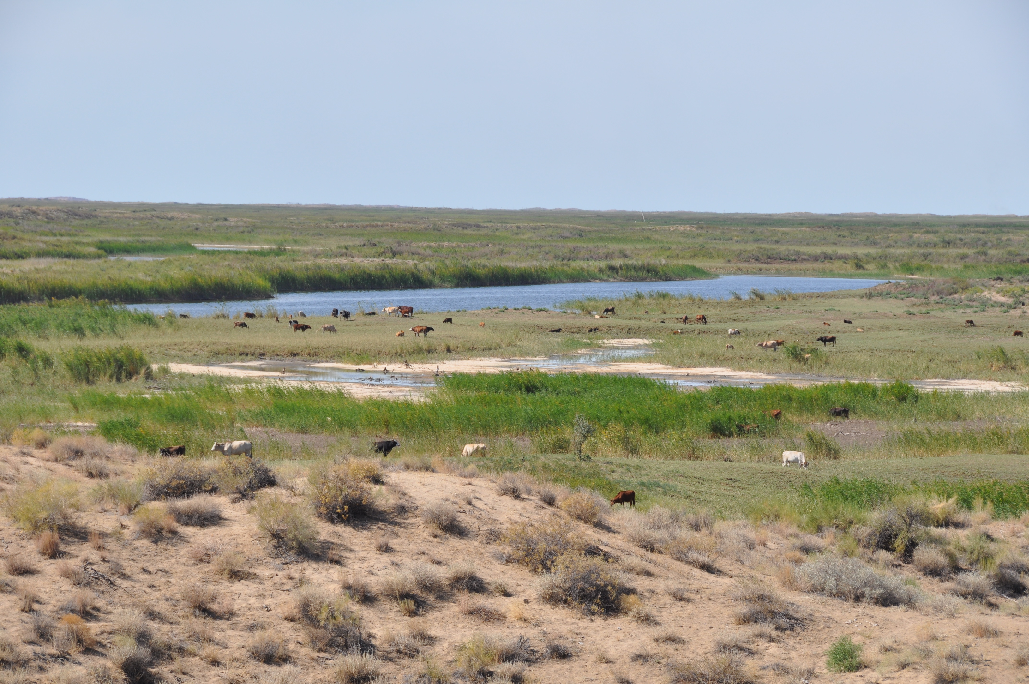Livestock farming in the Ili Delta under changing water flow - effects on food security and adaption strategies

Background
Flood plains, river deltas and wetlands are the most productive and divers’ ecosystems in the huge dry zones of Central Asia. These ecosystems play a central role in the food security of large populations in Central Asia, because they provide the most productive pastures and hay meadows. These regions, as downstream areas, are the most vulnerable ecosystems within Central Asia's river systems, because they depend on water, which are left by irrigated agriculture, dams and other water users. The most visible and best-known example is the almost dried up Aral Sea with the partly degraded Amu-Darya-Delta.
The Ili Delta is located in the southeast part of Kazakhstan, at the western shore of Lake Balkhash. It has an extension of 8.000 km² and is the biggest delta region in Central Asia. The delta completely dependent on the water flow of the Ili River. About two thirds of Ili's water flow originate in China. Due to the expansion of irrigated agriculture, effects of climate change as well as shortcomings of inter-governmental agreements; the Ili Delta is threatened by water shortages and subsequent pasture degradation. The reduction of Ili River’s run off affects the direct water supply for humans and livestock within the delta region. Also, it will decrease available pastures and has therefore negative impacts on the food production for large populations, even beyond the Ili Delta.
Content/ objectives
The project aims to assess the threats of water shortage and pasture degradation to livestock farming systems and to determine the effects on food security. Furthermore, its focus will be the development of appropriate measures in the field of water, pasture and feed management as well as the development of alternative fodder plants to reduce that threat. We already obtained knowledge on vegetation, biodiversity, fishery and land use of the Ili Delta within the ECO-Ili project.
- With the collaboration of our project partners, we will work on the following key issues:
- Economic, political and institutional conditions of pastoral farming at local level
- Pastoral farm systems, their profitability and significance for food security
- Water management for pastoral farming and drinking water supply
- Management of pastures and feed under changing water flow
- Use of alternative, salt and drought resistant fodder plants
Integration of young scientists
The project also aims at the integration of junior scientists, as post docs, PhD, master and bachelor students from Kazakhstan and Germany. They will work together on specific key issues in a tandem. The project work will improve their scientific skills and encourage international partnerships between Germany and Kazakhstan. Furthermore, students and junior scientists of Central Asian partners will take courses in the International Master Program 'Landscape Ecology and Nature Conservation', e.g. Pasture Science, Environmental Economics, Cost-Benefit Analysis and Landscape Economics, at the University of Greifswald.
Through the investigations, we will derive recommended actions for pastoral farming under changing water levels and water shortage.

Project description
Title:
Livestock farming in the Ili Delta under changing water flow – effects on food security and adaption strategies
Funded by:
Federal Ministry of Education and Research
Duration:
01.11.2018 – 31.10.2020
Project lead:
Prof. Dr. Volker Beckmann
Project implementation:
Elisabeth Baranowski, Dr. Niels Thevs
Cooperation partners:
Kazakh National University – Al-Farabi, Almaty Kazakhstan
Prof. Dr. Sabir Nurtazin
Kazakh National Agrarian University, Almaty Kazakhstan
Prof. Dr. Kuat Nurgazy
International Center for Biosaline Agriculture (ICBA), Tashkent Uzbekistan
Prof. Dr. Kristina Toderich
World Agroforestry Center (ICRAF), Bishkek Kyrgyzstan
Dr. Niels Thevs
